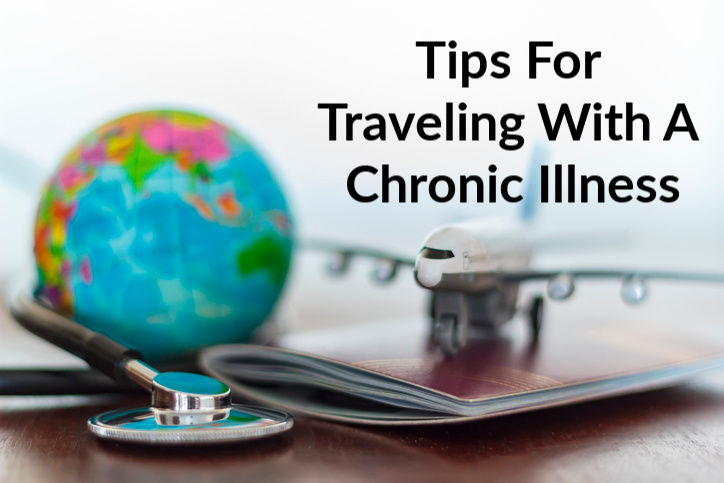You don’t need to let your chronic illness stop you from traveling and enjoying your vacation. Whether you have arthritis, IBS, diabetes, celiac disease, COPD, asthma, or another chronic illness, there are things you can do to make traveling more comfortable for you. Read on for some tips for traveling with a chronic illness.
Preparation
One of the most important tips for traveling with a chronic illness is to plan ahead for everything and prepare as much as possible. Prior to traveling, you will want to think through each phase of your trip and consider anything that may occur that could be a challenge with your chronic illness.
Choose the Right Destination
One of the best tips for traveling with a chronic illness is to think of what type of destination is best for you. Research what type of climate and geography best suits your health. For example, the sun can trigger a lupus flare-up, or a destination with excessive walking and stairs may not be suitable for people with arthritis or asthma. Be sure to research your travel destination thoroughly, including transportation options once you arrive. If you have limited mobility then you will want to choose somewhere that has accessible public transportation or consider private transportation. Also, make a list of the local hospital and urgent care center at your destination.
Scheduling Activities
Be sure to set realistic expectations for yourself and your travel companions. That means to include realistic activities on your itinerary, and not packing your schedule so full of things to do that you have no time to recover. Be sure to pad extra time in your schedule for any health issues you may have on your trip. If you are planning to do physical activities, stagger more leisurely activities in between. The last thing you want is to stress yourself out by trying to do too much.
What to Pack
You will want to bring any items you use at home for symptom relief in case you have a flare-up during your trip. This can include rescue medications such as inhalers, as well as heating pads, pain relievers, hot/cold compresses, neck pillows, and a sleep mask. Pack a water bottle and enough of your favorite snacks so you have plenty of safe foods to eat if you have special dietary needs. Also pack the usual items such as hand sanitizer and disinfectant wipes, as well as entertainment like audiobooks, games, and headphones.
Bring enough of your medications to cover the duration of your trip and include extra doses in case of delays or emergencies. Medications should be in the original containers and always packed in your carry-on luggage. You should also include a document listing your medical condition, as well as your medicine dosage schedule, your doctor’s contact information, and emergency contact information.
At the Airport
If you are traveling by air, there are some things to consider before traveling. If you are on a restrictive medication schedule, you should consider flight times and duration. Will you need assistance getting to the gate or boarding the plane? What is your airline’s policy on assistive devices like a walker, cane, or wheelchair? Even if you don’t normally use a wheelchair, you may find it easier to navigate the airport, so you may want to rent one at the airport.
Traveling by Car
Driving to your destination may offer you more freedom as far as when you can stop for breaks. If you are driving, you might want to consider mapping out rest stops or bathroom breaks along your journey, as well as restaurants if you have a specialty diet.
Traveling On A Cruise
There are plenty of things that can be arranged ahead of time. Your travel consultant can assist you with renting wheelchairs, motorized scooters or even respiratory oxygen to be waiting for you in your cabin. Refrigerators, containers to dispose of needles or distilled water for CPAP machines are other example of things that are easily arranged. Special diets such as gluten free, dairy free or nut free can also be accommodate. The main thing is to plan ahead.
Related: Gluten Free Cruising
Having a chronic illness shouldn’t stop you from traveling. It just takes some careful planning and preparations to make sure you have a comfortable and fun vacation.
Note: We share tips for health, travel & preparedness, but this is not official medical advice. Please contact your medical professional if you have questions or symptoms.








